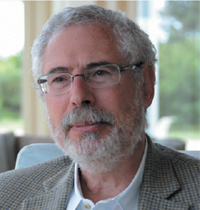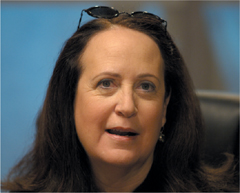CHAPTER
17
Career Advice
It’s not about the Porsche.
—Steve Blank
There is an old axiom that says we learn from our failures. A Harvard Business School study1 indicates this may not be the case. While the executives certainly had failures and made mistakes along the way, it would be more accurate to say that they learned from their successes and from their mentors, as well as from their failures.
Here they share some hard-won tips that you will find useful in managing your own career growth.
What’s Hot and What’ s Not
The key to success lies in doing what you love. Brenda Rhodes told me:
I speak a lot to younger people who are trying to find their careers. And the number one question they ask is, ‘Where’s the big money going to be in the next decade? What’s going to be hot?’ I answer, ‘What do you love? That’s what’s going to be hot.’
When I was a teenager, my mother used to take me around to the big homes in Saratoga. I’d ask, ‘What does that man do to get that house?’ She’d say, ‘That man made some sort of a disk thing, computer thing.’ I’d point to another house and ask, ‘What does that person do to get that house?’ She’d say, ‘He owned shoe stores.’ And so it went from house to house. I quickly put it together that maybe I could be successful doing just about anything, if I loved it.
Ned Barnholt would agree that it’s more important to do what you love than to do just “what’s hot.” He reminds people that a career is a forty-year journey, so doing work that you enjoy, the best that you can, in a good organization is critical. Very few of us will become a CEO, or even work at the C-level, so it’s important to get satisfaction at whatever level you are working.
Audrey MacLean said:
It all starts with your own sense of the value of the product and your commitment to bringing it to market. Then it’s a matter of spending a lot of time helping your customers be successful using it.
Aim High
For John Kispert career success is all about setting goals:
Be uncompromising with your goals. Invest in them. Persist. You’re going to run into lots of roadblocks. It will be filled with frustration, and that’s really the trick to this whole thing—how you handle the frustrations and get to that goal. That’s the skill set companies are looking for: being able to solve problems, and get people to do better than they’re doing today.
Leadership is about how to get the best out of people and organizations. Develop the skills of communicating and pulling people along, and making your point, and getting people to coalesce around bigger and broader ideas. Drive for change. Don’t be afraid of change. Status quo just kills things.
Career Goals
My ego was measured by my head count.
—Steve Blank
The real secret to success, according to the executives I interviewed, lies in how you define that success. Steve Blank recalled:

For the first 10 years of my career, I was focused on being my job title. I was a vice president of a public company when I was 29, and I bought a Porsche the day I turned 29. I used to think that what mattered was the next title. I wanted to be a manager. I wanted to be a director. I wanted to be a VP. It was all about moving up the ladder so my ego could fill the available slot. Those external trappings sure looked good: bigger office, more head count. Man, that was a career goal. I nailed it. It was exciting. Plenty of people do it that way. You step over other people and you elbow your way up using whatever political and cultural acumen you have.
I contend, though, you’ll live a much happier life if you do what’s authentic and honest, rather than be a title. Because when you get to the top, after scrambling because you wanted to be VP, you might find out it’s pretty empty. It affects your relationships: your family, your spouse, and how you deal with other people. Clamoring up the ladder may affect you in ways you might not like a decade or two later.
A Zen-like Moment
All of a sudden Steve had an insight that changed everything:

Steve Blank
After focusing on being my titles for the first 10 years, one day, something snapped. Just snapped. Just a clear break. I realized I was measuring my life by the wrong thing. It was a Zen-like moment. I know exactly what made that happen: I had my first child. You know, if you’re single, your whole life is focused on you. It is about you. The first part of my career was pretty selfish. I had kids later in life. I watched some of my peers make choices where they still put work first after having children. And I saw the effect that that had on their kids as they grew up.
I consciously decided: work is important to me, but now there’s something that’s more important. That was a big idea for me. Getting that work/life balance was something that made my last decades as an entrepreneur and then as a CEO really different than it was for a number of my peers. And it’s why I retired at an early age, to be with my family.
Learn Their Names
The CEO of Elanco got on the elevator with Ginger Graham and knew her name. That affected her so deeply, she has made it a point to learn people’s names in companies where she has worked ever since:
I was one of many junior marketing associates, and brand new to the home office. He was in the elevator with me and addressed me by name, and asked about my transition to the home office. It was so impressive to me that he had taken the time to remember who I was, knew a little about me, and reached out to me. I knew then that I would always work very hard to remember people’s names.
Similarly, Ned Barnholt and Dan Warmenhoven saw their role models connect with employees in non-hierarchical ways. They both adopted similar approaches in their own leadership styles.
Empathy and Beer
It may be a cliché to say that it’s lonely at the top, but most clichés reflect some truth. As John Kispert pointed out, when the job of the C-level executive means doing what’s best for the company regardless of the competing agendas of boards, consultants, investors, bondholders, customers or employees, you’re guaranteed to disappoint a lot of people a lot of the time.
Maybe that explains Felicia Marcus’ observation that once someone gets into a senior-leadership role, he or she is no longer treated as a person, but as the enemy. She advises people to get beyond that attitude:

Felicia Marcus
Think about the boss as a full person rather than as a potential torturer or an irrational person who has too much power over you. Figure out how you can be helpful to them. Part of that is not being afraid to ask them questions about what they’re trying to accomplish and how you can best help them achieve their goals.
Felicia feels a critical career skill is being able to understand how complex the top jobs are and actually extend empathy to the senior people who are running the company. (Recall from the work of Krause and Keltner, in Chapter 2, that the subordinate is unlikely to receive much empathy in return.) She recommends finding informal ways to get to know the boss and even invite him or her out for a beer and engage with them where they don’t have to be the decision maker. “That is more important to them than you might realize.”
Strive to Build a Team
It is a false idea that some individual or superstar CEO uniquely makes great things happen. That is very misleading. There’s nothing that can be associated with my career as a success that I did alone.
—Ginger Graham
Heroes are important but they’re probably not the best people to manage an organization over time.
—John Kispert
Asked about career success, the executives talked about collaboration and teamwork. Not only was teamwork a hallmark of the C-level executives’ own careers, they also expected it in their subordinates.
John Kispert prizes a teamwork attitude in future leaders:
Teamwork and the ability to work “across the aisle” are paramount. You have to be cognizant of that as you are growing people and looking for people to promote and bring up in the organization. Who are the people that have that raw ability to bring out the best in others? Frankly, that’s a big challenge that anybody like myself has every day. For the health of an organization, it is probably the number one challenge.
In the course of being CEO of several companies, Dan Eilers learned that he couldn’t do it all himself. Success is a team effort:
I learned that no one really works directly for me, but rather that we’re all in it together. We’re all here to grab customers, pull them in, do right by them, and to give them something unique and better than the competition is giving them. Better, faster, cheaper. And that’s our role in life. That’s what we’re here to do. And to the extent we can all rally around that together, that works far better than an individual focus. It’s a huge amount of team building.
From the first days of Dan Warmenhoven’s involvement with NetApp, the management team was committed to a collaborative model based on teamwork:
The idea was that people who are feeling part of a team where their voice is heard, where they feel like they have the support of their teammates who are moving in the same direction, would be higher performing and produce a better outcome. And that, in fact, is the way it’s worked out.
The ability of people to team together effectively, to get something where the whole is greater than the sum of its parts is absolutely essential. Great teams can do great things. The collaborative scheme was put together here as a core cultural component right from the time I started.
For Ned Barnholt, the individual getting credit is not the point. What matters is how the organization uses the idea:
The important thing is that you had a role in helping move the organization along. Don’t get hung up on who gets credit for what. Just do the right thing and do it consistently over and over again, and you’ll get recognized and rewarded.
Personal Growth
Reflecting back on her time as a CEO, Ginger Graham, commented that teamwork was not just about a higher performing company, it was also about personal development and about the fun of growing something great. Although Ginger didn’t use the words of psychologist Abe Maslow, she seems to be saying that through teamwork people can become “self-actualized” at work:
Great things are accomplished at great expense, personally. People sacrifice. They give up time. They work long hours. They have horrendous travel schedules. They expend personal energy and take risks. That’s how you make things happen that matter. And that always was based on a group of people around me who were willing to bet with me, not against me, or not in spite of me, but with me. Who threw their chips in and said, ‘Yes, we’re in.’
That is how the fun happened.
That is how work was exciting.
That is how contributions were created.
That is how all of us grew up and were better people for it.
Ginger had additional sage advice for the aspiring senior-level leader:
Realize the more you give away power, the more you share power. The more you include other people in the great successes, the more powerful and the more successful you become. It’s by building others up that you become successful. Leaders create leaders, not followers.
Remember to Laugh
Finally, Dan Eilers counseled up-and-comers along with those who have arrived to “keep your cool no matter how intense the pressure and to keep a sense of humor.” He recalled how President Ronald Reagan always managed to inject humor into a situation no matter how tense. Looking up from the gurney after being shot, he said to the ER physician, “Well, Doc, I sure hope you’re a Republican.”
Summary
There you have it—career challenges (Chapter 16) and career advice from those who’ve struggled up the mountain before you. Even though you may not have your sights set on a C-level position, what they have described here is counsel worth considering at any level:
• Question the notion of “work/life balance”
• Choose the right spouse
• View critical feedback as a gift
• Connect personally with employees
• Have empathy for your bosses and think of them (and treat them) as real people
• It is more about the team than the individual “star”
• Empower others to gain power
• Don’t take your role too seriously, there is more power in the organization than in the individual
